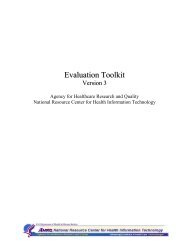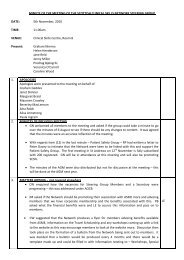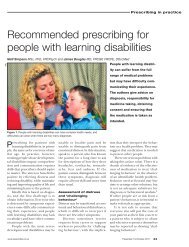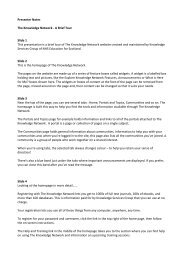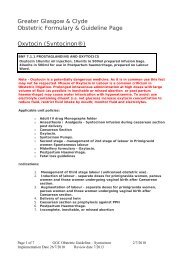The Fife Dementia Strategy: 2010 â 2020 - The Knowledge Network
The Fife Dementia Strategy: 2010 â 2020 - The Knowledge Network
The Fife Dementia Strategy: 2010 â 2020 - The Knowledge Network
Create successful ePaper yourself
Turn your PDF publications into a flip-book with our unique Google optimized e-Paper software.
4.7.2 Care at home providers regularly review and respond to the<br />
changing needs of service users with dementia, and that this is done<br />
using a multidisciplinary approach with a single, shared care plan.<br />
<strong>Dementia</strong> is a progressive condition. For many people living with dementia<br />
care at home may be the primary or potentially only support delivered within<br />
the home environment. Care plans are a very important aspect of care at<br />
home services as they guide home care workers, and may also provide vital<br />
information for acute care staff and other health and social care professionals<br />
in an emergency situation. Regular and accurate reviews and updates, and<br />
easy accessibility are necessary to ensure that personalised services are<br />
being provided in an integrated fashion which meets the changing needs of<br />
the individual with dementia. Information must be communicated across<br />
services, and care routines and practices followed as closely as possible –<br />
people must not have multiple care plans with variable information. One care<br />
plan should be utilised and shared across all services the person uses with<br />
channels for sharing changes and updates well established and followed.<br />
Currently for all services provided or commissioned by the Council, formal<br />
care plan reviews are to occur a minimum of every six months, with all<br />
external providers supplying the Council with updates of the review and<br />
notifying the Council to any alterations in the care plan (increased or<br />
decreased need). <strong>The</strong>re are reported issues with the implementation and<br />
monitoring of the current system as changes in need and care plans are not<br />
always communicated to the appropriate bodies. A review is required to<br />
improve understanding of the current issues, and alternate models for<br />
information sharing should be considered to ensure equality in the<br />
assessment of need and allow for better regulation of external providers.<br />
<strong>The</strong> content of care plans must include relevant information about the person<br />
with dementia, including their personal preferences and needs, and a brief life<br />
history, including their past residences and the contact details of family and<br />
friends. This was identified as being of high importance by the Police and<br />
other services during an emergency situation, especially when a person with<br />
dementia becomes lost or disorientated as they may attempt to return to these<br />
locations. It is also necessary that the care plan is located in an easily<br />
identifiable and accessible location, and that this location is the same for all<br />
individuals receiving support at home.<br />
<strong>The</strong> single care plan will be used across services in organisations to improve<br />
continuity in care. And, while it is recognised that some information may not<br />
be shared due to data protection, the single care plan will act as the basis for<br />
coordinating care delivery.<br />
52




